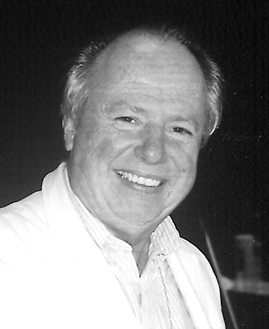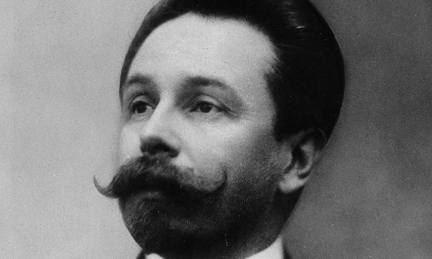Printed in the Winter 2016 issue of Quest magazine.
Citation: Wadlow, René . "Alexander Scriabin: Music of Ecstasy and Light" Quest 104.1 (Winter 2016): pg. 22-23
By René Wadlow
The compo ser Alexander Scriabin (1872–1915) was a key figure in what is commonly called the Silver Age in Russian history (from the 1890s to the outbreak of World War I in 1914). This era saw a surge of interest in mysticism and in the occult and philosophical teachings of India and China, along with influences from Germany, including the thought of Nietzsche and the Christianized version of Theosophy developed by the Austrian visionary Rudolf Steiner. Rudolf Steiner’s second wife, Marie von Sivers, was a Baltic Russian. She helped spread Steiner’s views in Helsinki and Warsaw, cities in close contact with Russian intellectual circles.
ser Alexander Scriabin (1872–1915) was a key figure in what is commonly called the Silver Age in Russian history (from the 1890s to the outbreak of World War I in 1914). This era saw a surge of interest in mysticism and in the occult and philosophical teachings of India and China, along with influences from Germany, including the thought of Nietzsche and the Christianized version of Theosophy developed by the Austrian visionary Rudolf Steiner. Rudolf Steiner’s second wife, Marie von Sivers, was a Baltic Russian. She helped spread Steiner’s views in Helsinki and Warsaw, cities in close contact with Russian intellectual circles.
One element of Theosophical thought, especially in H.P. Blavatsky’s The Secret Doctrine, which Scriabin read closely, was the idea of esotericism — hidden or secret knowledge which passes from age to age and from country to country. This hidden knowledge is taught in small inner circles or can be discovered through a careful study of the literature and the development of the individual’s higher consciousness by meditation. For Scriabin, music of certain sorts had the power to open the door to this hidden and transformative knowledge. (For a Theosophical assessment of Scriabin’s music, see Cyril Scott’s book, cited below.)
Scriabin came from an aristocratic Russian family. His father was a diplomat who was usually posted abroad and had little contact with his son. Scriabin’s mother was a well-known concert pianist but died when Scriabin was only one year old. He was raised by his father’s sister and mother, both of whom were musicians. As Scriabin showed an interest and talent for music, he started to learn the piano at an early age with a teacher who was also teaching the composer Sergei Rachmaninoff. The two students became lifelong friends, and Rachmaninoff did much to promote Scriabin’s piano works after the latter’s early death at the age of forty-three.
Scriabin followed the classic Russian path for musicians, going to the Moscow conservatory, and at an early age he married another young pianist, Vera Ivanova Isakovich. Like many Russians of that time and class, they decided to travel abroad, and so from 1904 to 1909, they lived in Paris and spent time in London, Brussels, and the U.S. In 1907 in Paris, Scriabin collaborated with the producer Sergei Diaghilev to introduce Russian music, dance, and art to the French artistic milieu.
Scriabin found time to produce four children with his wife, as well as taking a second “wife,” Tatyana Schloezer. Finally Vera agreed to a divorce, and Tatyana became his legal wife. They had three children. In addition to music, Scriabin believed that sex was an avenue to secret knowledge. At the time in Theosophical circles there was a good deal of interest in the awakened kundalini, the serpent fire, said to be coiled at the base of the spine. With proper breathing exercises and meditation, the serpent can rise up to the Third Eye between the brows and then to the crown of the head, producing enlightenment and liberation from matter. Scriabin used yogic breathing exercises to work with the kundalini. One problem — which did not occur with Scriabin alone — is that the fire often rises from the base of the spine but only reaches as far as the sex organs and stays there. Later, in the period between 1930 and 1940, when Scriabin’s music was considered to be out of line with officially favored school of Socialist Realism, it was attacked for “its unhealthy eroticism.” Scriabin’s life was given as proof that his music stimulated sex and took the workers’ minds off production goals. Today, with Russia’s fast-declining birth rate, there seems to be a strong revival of interest in Scriabin’s music.
 |
| Alexander Scriabin |
One of Scriabin’s most explicitly Theosophical-spiritual compositions, following concepts put forward in The Secret Doctrine, is Prometheus: Poem of Fire. In the usual account of the myth, Zeus has the titan Prometheus make humans out of mud. Prometheus, taking pity on the condition of the creatures he created, steals fire from heaven and gives it to them. Zeus punishes Prometheus by having him bound to a rock, although he is eventually freed by Hercules.
In Scriabin’s Theosophical retelling, Prometheus does not steal the fire but is given it consciously by Zeus in order to produce “the ray of light” in humans. Thus Prometheus is like Lucifer, the “light bringer” who imparts the mind with the capacity to understand the causes of progress and regression. In this version Zeus does not punish Prometheus. Instead, being bound to a rock is a symbol of the difficulties on the spiritual path, the progression of spirit through matter, to return liberated as spirit, but at a higher degree of evolution at the end of the cycle than at the beginning.
In the Soviet Union and even in today’s Russia, Scriabin’s music has been treated as music largely separate from his philosophical ideas. In 1922, after the end of the Russian Civil War, when the Soviet government could start thinking about culture, Scriabin’s Moscow apartment was made into a state museum and kept in the condition it was in when he was alive, with his esoteric books visible in the library. Except for the 1930–40 period — the harshest time of Stalin’s repression — Scriabin’s music has been played continuously in Russia. When Soviet cosmonaut Yuri Gagarin, the first man in space, was orbiting in his craft in 1961, Russian radio sent up the music of Scriabin’s Poem of Ecstasy, which became a kind of theme song for the flight after Gagarin landed.
The spiritual foundation of Scriabin’s music is no longer unknown in Russia, but it is not stressed either. As is often the case, esoteric knowledge remains esoteric. With a knowledge of the spiritual quest, one can hear his music with different ears.
René Wadlow is president of the Association of World Citizens and is a representative to the United Nations, Geneva, on its behalf.
Suggested Reading
Carlson, Maria. No Religion Higher than Truth: A History of the Theosophical Movement in Russia, 1875–1922. Princeton: Princeton University Press, 1993.
Rosenthal, Bernice G., ed. The Occult in Russian and Soviet Culture. Ithaca, N.Y.: Cornell University Press, 1997.
Scott, Cyril. Music: Its Secret Influence throughout the Ages. New York: Samuel Weiser, 1958.

